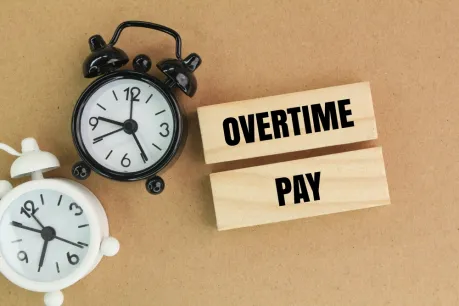Who Doesn’t Get Overtime or Minimum Wage Under Federal Law?

Injured?
Not everyone is entitled to overtime pay. If you’re on a salary and work in a specific type of role, you might be classified as exempt under the Fair Labor Standards Act (FLSA). This includes positions like managers, administrative professionals, certain tech workers, and outside salespeople.
But many people don’t realize that having a high-level job title isn’t enough. Exempt status depends on what you do, not what your business card says, and how much you earn.
Below, we’ll break down which roles typically qualify for exemption and which ones don’t, so you can better understand where you stand.
Basic Pay Rules
Under federal law, most workers in the U.S. must be paid at least $7.25/hour (the current minimum wage) and receive overtime for work over 40 hours a week. Overtime pay is usually time and a half for each hour worked.
But Section 13(a)(1) of the FLSA makes exceptions for certain “white-collar” employees. Examples of such employees include:
- Executives
- Administrators
- Professionals
- Outside sales reps
Note that some computer employees are also exempt under a separate section.
To be exempt, you generally need to meet two big tests. First, your job duties match the exemption criteria. Secondly, you get paid a salary of at least $684 per week.
You can also count bonuses or commissions toward 10% of that salary minimum, as long as they’re nondiscretionary and paid regularly.
Now, let’s look at the different categories of employees.
Executive Employees
To qualify as an exempt executive, all of these must be true:
- You’re paid at least $684 a week on a salary basis
- Your main job is managing the business, a department, or a team
- You regularly supervise two or more full-time employees (or the equivalent)
- You have hiring or firing power, or your input on staffing decisions actually matters
Administrative Employees
To be exempt under the admin category, you must:
- Make at least $684 a week
- Do office or non-manual work directly tied to the company’s operations or the operations of clients
- Regularly use your judgment and decision-making skills on important matters
Professional Employees
This one splits into two subcategories: learned professionals and creative professionals.
Learned professionals must:
- Earn at least $684 a week
- Do work that requires advanced knowledge in a field like science or education
- Use intellectual skill and judgment
- Have a degree or specialized training to do the work
Creative professionals must:
- Also, make at least $684 per week
- Use imagination, originality, or talent in a recognized creative field—think writing, music, or design
Computer Employees
Tech workers have their own category. To qualify:
- You must be paid either at least $684 per week (salary/fee) or $27.63 per hour
- You must work as a programmer, software engineer, systems analyst, or similar
- Your main job must include one or more of these: system analysis and user consultations, designing or building software, programming or testing operating systems, or a mix of all of the above that requires advanced skill.
Outside Sales Employees
To qualify here, your main duty must be making sales or obtaining contracts for services, and you must work primarily outside your employer’s business location.
Highly Compensated Employees
If you make $107,432 or more per year, including at least $684 per week on a salary or fee basis, you may be exempt. This rule applies only if you regularly perform at least one duty that falls under the executive, admin, or professional exemption categories.
Who’s Not Covered
The exemptions only apply to white-collar jobs. So if you work in a hands-on trade or perform physical labor, you’re not exempt. How much you earn doesn’t matter here.
That said, minimum wage and overtime laws protect the following employees:
- Construction workers
- Electricians, mechanics, and plumbers
- Carpenters and machinists
- Maintenance staff
- Operators, laborers, and other blue-collar workers
The law doesn’t care how skilled or well-paid you are. The bottom line is, if you’re working with your hands or doing repetitive physical work, you’re covered by the FLSA.
First Responders Are Always Covered
The exemption rules don’t apply to police, firefighters, EMTs, paramedics, and similar workers. Even if you’re highly trained or have a leadership title, the law guarantees minimum wage and overtime.
That includes people doing things like:
- Rescuing victims
- Conducting investigations
- Making arrests
- Supervising inmates
- Writing up reports or performing surveillance
Other Laws and Union Agreements Still Apply
Federal laws work pretty much like the baseline. States and cities can raise the bar if they so wish. If your local laws or union contract offer better pay or more time off, your employer has to follow the higher standard.
Employers can’t use the FLSA to get around other protections.
Also, collective bargaining agreements can’t take away your FLSA rights. But they can give you more, like a shorter workweek or a higher overtime rate. So if you’re in a union, you might already have stronger protections.
Disclaimer: This information is based on fact sheets the DOL provides.
Contact Morgan & Morgan Today
If you’re not sure whether you should be getting overtime or if your job duties don’t match your exempt status, the labor and employment attorneys at Morgan & Morgan can help you figure it out. Get in touch today for a free case evaluation.

We've got your back
Injured?
Not sure what to do next?
We'll guide you through everything you need to know.

